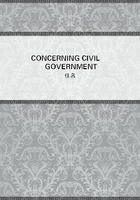
第17章
72. Though the obligation on the parents to bring up their children, and the obligation on children to honour their parents, contain all the power, on the one hand, and submission on the other, which are proper to this relation, yet there is another power ordinarily in the father, whereby he has a tie on the obedience of his children, which, though it be common to him with other men, yet the occasions of showing it, almost constantly happening to fathers in their private families and in instances of it elsewhere being rare, and less taken notice of, it passes in the world for a part of "paternal jurisdiction." And this is the power men generally have to bestow their estates on those who please them best. The possession of the father being the expectation and inheritance of the children ordinarily, in certain proportions, according to the law and custom of each country, yet it is commonly in the father's power to bestow it with a more sparing or liberal hand, according as the behaviour of this or that child hath comported with his will and humour.
73. This is no small tie to the obedience of children; and there being always annexed to the enjoyment of land a submission to the government of the country of which that land is a part, it has been commonly supposed that a father could oblige his posterity to that government of which he himself was a subject, that his compact held them; whereas, it being only a necessary condition annexed to the land which is under that government, reaches only those who will take it on that condition, and so is no natural tie or engagement, but a voluntary submission; for every man's children being, by Nature, as free as himself or any of his ancestors ever were, may, whilst they are in that freedom, choose what society they will join themselves to, what commonwealth they will put themselves under. But if they will enjoy the inheritance of their ancestors, they must take it on the same terms their ancestors had it, and submit to all the conditions annexed to such a possession. By this power, indeed, fathers oblige their children to obedience to themselves even when they are past minority, and most commonly, too, subject them to this or that political power. But neither of these by any peculiar right of fatherhood, but by the reward they have in their hands to enforce and recompense such a compliance, and is no more power than what a Frenchman has over an Englishman, who, by the hopes of an estate he will leave him, will certainly have a strong tie on his obedience; and if when it is left him, he will enjoy it, he must certainly take it upon the conditions annexed to the possession of land in that country where it lies, whether it be France or England.